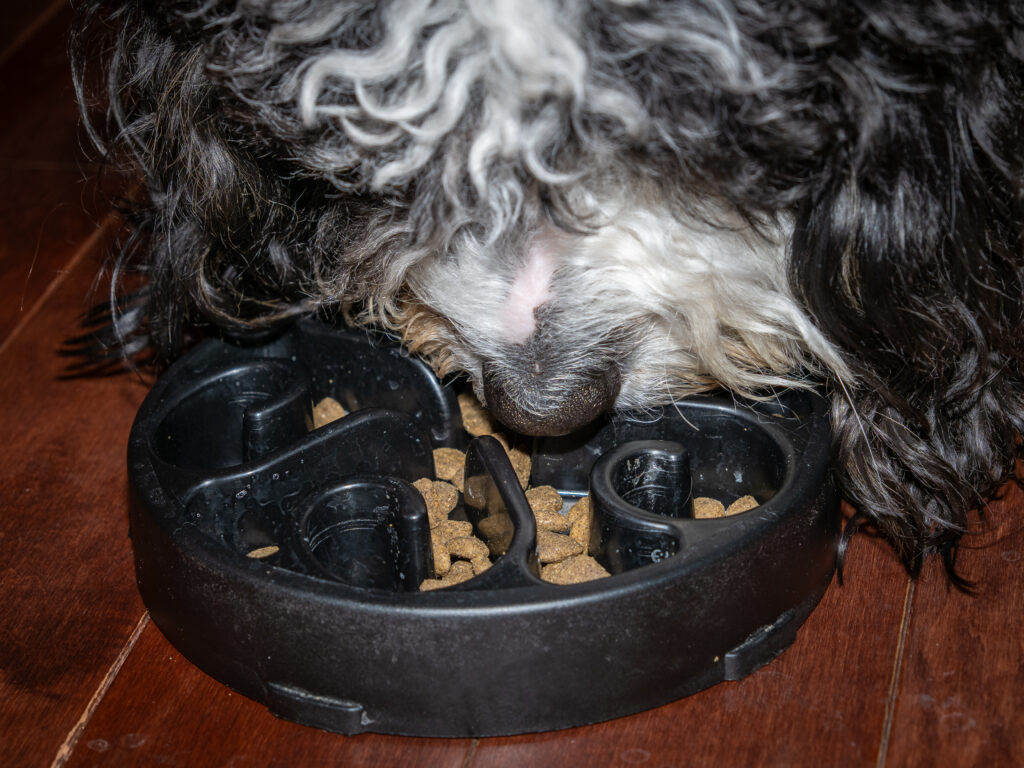
10 Bernedoodle Health Issues & Symptoms To Know Now!
Are you looking into or raising an adorable bernedoodle pup? If so, you should know the common bernedoodle health issues and what their symptoms look like. Knowing about the symptoms and being prepared is the best thing you can do for your dog. From to well known health issues like Bloat to Chronic Ear Infections, we’ll go over all of the important ones!
As always, we strive to bring you up-to-date, research-based information on dog diet, health, and nutrition to give your best friend the long life they deserve.
This article is all about the 10 common bernedoodle health issues, symptoms, and next steps.
Bernedoodle Background
By now, if you’re reading this, you know what a bernedoodle is and how adorable, fluffy, and sweet they are! They are not registered as a breed according to the AKC and neither are any other doodles.
Bernedoodles are a very recent thing. They gained popularity in the early 2000s when doodles became popular. This should not make or break your opinion on getting a bernedoodle, but it does mean that there are not many studies on their health and wellness. In fact, no studies have been done exclusively on bernedoodles.
Therefore, it’s important to note that it’s hard to say what health issues might arise in bernedoodles. Health issues can arise from common issues linked to both the poodle or the Bernese mountain dog (BMD) side, or from one specific side. Since it is a mixed breed, it is very hard to predict what health issues can arise.
These 10 common bernedoodle health issues we’ll discuss have been common among bernedoodles, based on both bernedoodle owners’ subjective experience and common genetically predisposed health issues between the two breeds. Each will be explained, along with symptoms to look out for, and what the best next steps are.

10 Common Bernedoodle Health Issues To Know
Obesity
Obesity is a health problem that can happen to all dogs, the BMD, Poodle, and bernedoodle included. Though both the BMD and Poodle are not genetically predisposed, it does not mean they cannot be affected without proper feeding, care, and exercise.
Symptoms include noticeable weight gain, fatigue, shortness of breath with otherwise normal exercise activity, and having trouble getting up. Another telltale sign is by feeling for their ribs while they are standing. You should be able to feel for their ribs without having to put pressure or push in. Another test is to look at their body figure when their standing. Does it look like an hourglass, with the chest protruding out and the belly curving inward?
Obesity can occur for many reasons including overeating, overfeeding, and undrlying health issues. Any feat to rid obesity caused by a health issue will not work. If you notice significant weight gain within a short period, coupled with any other unusual symptoms, go to the veterinarian to rule out any underlying health issues. If tests come back normal, taking a mixed approach of more exercise, and limiting their diet, among other things can help. Creating a detailed and effective diet plan can be stressful and time consuming, but can also be the most rewarding and helpful thing you can do for you dog.
Heart Issues
Both Poodles and Bernese Mountain Dogs are prone to different types of heart disease, which means bernedoodles are as well. Heart disease is caused by a multitude of factors, some preventable and some not.
Common symptoms are coughing, shortness of breath, getting more tired on walks or when playing, and increased weakness. This can occur early in age or much later in each, quickly or very gradually, so early detection and knowing the symptoms early is key! Once you notice any of these symptoms, go to the vet to get a physical exam.
Allergies
Just like both breeds, bernedoodles are prone to allergies. There are different types of allergies, including food allergies, skin allergies (environmental), and flea allergies.
Common symptoms include itchiness, skin hives, redness and swelling. This might even manifest into itchy ears and chronic ear infections, since bernedoodle ears are droopy.
Go to your vet at the first signs of an allergic reaction. Though most reactions are not deadly, it is good to start the process of determining what they might be allergic to and plan the next steps if an allergic reaction does happen again. They might recommend allergy shampoo and conditioner, topical treatment, or starting them on an elimination diet if due to food allergies.

Skin Issues
Since bernedoodles are a poodle mix, they are more prone to a multitude of skin issues. Without proper maintenance of their hair, hot spots, inflammation, and redness can all arise. Whether it be due to skin allergies or severe mats, topical treatments and proper weekly maintenance are key. Your bernedoodle needs to be brushed every other day if not every day! You’ll only need 3 tools, which goes a long way for keeping your fur baby groomed and healthy at home.
Cancer
Lymphoma is a type of cancer that affects Bernese mountain dogs more than other breeds. Moreover, since bernedoodles often live a long life, cancer might also become an issue with old age. Cancer is a common health issue among older dogs.
When you’re grooming your bernedoodle, make sure to look for swollen glands and any bumps. Some other symptoms are weight loss, labored breathing, and weakness. Go to the vet if you notice any unusual symptoms, coupled with any swollen glands, lumps, or bumps on their skin. Early detection is important with all cancer. Lymphoma, specifically, has a great prognosis with the right medication.
Thyroid Issues
Poodles are prone to thyroid problems, specifically hypothyroidism. Their bodies do not make enough thyroid hormone which can cause an array of issues with all parts of their body. Signs include dry skin, hair loss, weight gain, increased anxiety, and aggression. Symptoms are not localized to one area, as hormones play a big part if their entire bodily function. If the thyroid is not working well, this can cause a wide range of issues.
If you see any drastic changes in their health, take them to the vet to get tested for hypothyroidism. Once diagnosed, medication can help tremendously in bringing their bodies back into order.
Hip/Elbow Dysplasia
Hip dysplasia is a genetically inherited health issue common in both Poodles and Bernese Mountain Dogs. Elbow dysplasia is exactly the same, except in the front legs. The joint doesn’t fit quite right into the socket, causing pain and friction when moving. If minor, a mixture of joint supplements, physical therapy, and a good diet can suffice. However, if symptoms are severe, surgery can be an option.
Some common symptoms to look out for include decreased activity, range of motion, difficulty walking and limping, stiffness, and occasion, a swaying motion from their hind legs when walking (to compensate).
If you notice signs of your bernedoodle limping around or experiencing pain, get them on a joint supplement first. This one has been our favorite forever. Glucosamine, chondroitin, omega-3, and green lipid mussels are all ingredients you want in a joint supplement. Monitor the situation to see if it gradually gets worse, and go to the vet if they have a significant decrease in activity or movement.

Vision Issues
Your bernedoodle is also more likely to have progressive retinal atrophy, a fancy name for gradual vision loss. Common symptoms include night blindness, increased clumsiness, confusion, and sometimes not listening to physical hand commands, and increased opaqueness in their eyes (cataracts).
Though there is no cure at this time and no approved treatments to stop this, feeding them antioxidants can help the delay of onset. Antioxidant-rich foods include spinach, all dark leafy greens, red peppers, broccoli, and eggs are all a great start! Although, there is no cure, there are many ways to for blind dogs to live an amazing, happy, long life.
Ear Infections
Since bernedoodles have droopy ears, unsurprisingly, ear infections can be quite common. The inability to shake the dirt out will cause debris to get trapped, leading to an ear infection. Common symptoms to look out for are excessive head shaking or ear scratches, excessive dirt, redness, or foul odor in the ears.
Ear infections can be caused by dirt and can usually be resolved with ear cleanings at home. However, after 2-3 days of treatment with no symptom relief, take them to the vet to get treated. They can help to determine the cause and make sure nothing is lodged in the ear.
Gastric Dilatation-Volvulus (GDV)
GDV, commonly referred to as Bloat, is a health issue that causes the stomach to twist with food in the stomach. This cuts off blood flow to the other organs, a deadly disease if not treated within the hour.
Symptoms include excessive drooling, panting, difficulty breathing, dry heaving, enlarged abdomen, and restlessness. Know the symptoms and go to the vet if you notice any of these symptoms!
Prevention is key here. With larger dogs, make sure you give them an hour to rest after they eat. Give them time to digest their food before any vigorous exercise or play. This reduces the chances drastically of getting bloat.

How to Prevent Increased Health Issues
Brush Their Teeth Daily
I feel like this one is not touched on enough! Dental chews are NOT enough. You need to be brushing your bernedoodle’s teeth every day to reduce plaque and tartar buildup. The Veterinary Oral Health Council (VOHC) has a short list of toothpaste brands that are proven to reduce plaque and tartar build-up. For example, the Petsmile Professional Toothepaste is VOHC approved. Many dog owners use different toothpastes or report using coconut oil as a toothpaste. Based on subjective reviews, they seem to work well, but note that there are not many studies to show these alternatives do get rid of plaque and tartar buildup. There are beneficial ingredients in coconut oil, but not to say it can completely replace enzymatic toothpaste.
Give Them Daily Exercise
Your dog needs daily exercise, not only for their physical health but for their mental health and enrichment, as well. Having them stay active is great for their muscle and joint health, heart health, as well as stimulating their mind and getting their energy out!
Buy Health Insurance
Your bernedoodle will eventually have some health issues, if lucky, very mild. BUT, that does not neglect the fact that you should get them health insurance. Just as much as we age, and spontaneously get hurt or sick, the same thing can happen to your pup. The worst thing that could happen is trying to take care of your pup and a hefty bill at the same time. Do it, it will be worth it.
Find a Reputable Breeder
Find a reputable breeder who cares about the puppies they are bringing into this world, for reasons more than just money.
Let’s say you have a standard poodle who is genetically predisposed to have hip dysplasia. The next litter becomes highly likely to also have hip dysplasia. For them to continue to breed that poodle is not ethical. Bringing more puppies into this world without a care about their health, is not being a reputable breeder.
When finding a bernedoodle pup, look for a breeder who does genetic testing on their dogs. Look for a breeder who wants to genuinely know if you can take care of their puppies before giving them to you. Yes… it might cost more, but having a pup with multiple health issues down the line also costs a lot more. It is worth it to find a reputable breeder. It’s the best decision we ever made, the price was worth it.
Conclusion
Getting a bernedoodle is such a fun experience for anyone and everyone! Whether this is your first dog or an experience veteran with 5 dogs, being prepared is the best thing you can do. Knowing the common bernedoodle health issues, symptoms and next steps is the best way to do that! You can sit back and relax knowing that you know what to do if any issues arise. Now, go spend the next 5 mins giving your pup a belly scratch for me <3



